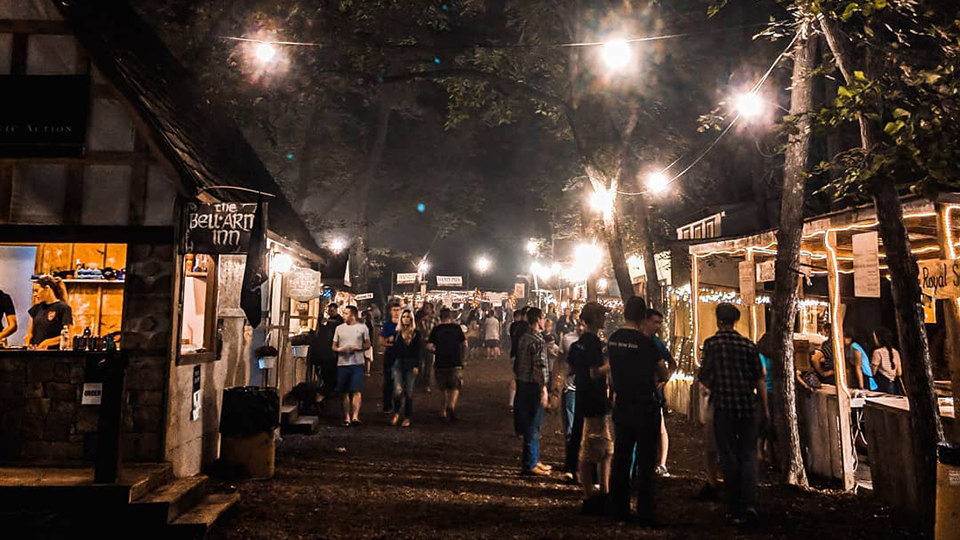Flint Hills Shakespeare Festival celebrates 10 years, K-State connection
Nestled within a grove of trees outside of St. Marys, Kansas, you’ll find a small
village that looks like it’s been transported from 1600s England.
Strings of warm, glowing lights twinkle in the darkness, and you can hear the sounds
of voices and laughter. The smell of cooking food drifts through the air, and vendors
are selling crafts and other wares to the visitors wandering up and down the dirt
paths.
However, at the moment most of the attention is focused on the main event — a performance
taking place on the stage in a nearby field, of a play written hundreds of years ago
by one of history’s greatest writers.
Now celebrating its 10th anniversary, the FLINT HILLS SHAKESPEARE FESTIVAL has grown from a small gathering celebrating the works of English playwright William
Shakespeare to a major production that draws around 7,000 over six nights. People
come to watch a classic Shakespeare play outdoors and also to enjoy the “village”
of vendors, which includes food, arts and crafts, music, a pub and more.
Celebrating the festival’s 10th year will be a proud moment for co-founder and K-State
alum Ben Moats ’08.
“I had long dreamed of doing something like this,” he said. “At its root, the festival
was inspired by a general love for the classical arts fostered by my upbringing and
the subsequent need to create that it inspired.”
To be, or not to be
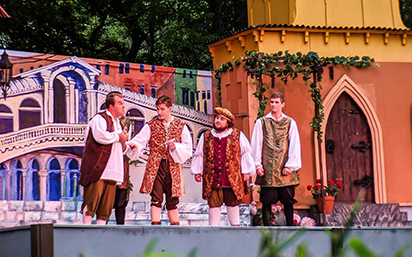 So how did the Flint Hills Shakespeare Festival come to life in St. Marys, Kansas,
a town of about 2,700 approximately 30 miles from Manhattan, Kansas?
So how did the Flint Hills Shakespeare Festival come to life in St. Marys, Kansas,
a town of about 2,700 approximately 30 miles from Manhattan, Kansas?
Moats said he knew wanted to “put down roots” and invest in the development of the
community. Along with two friends (Eric Stevenson and Tim Akers), he helped organize
the first show in 2010.
They started small on the fourth hole of the St. Marys Golf Course. About 600 people
attended. After their second year there, they realized they needed a permanent location
since they were only able to use the golf course during a narrow time window and had
already doubled their attendance.
In 2012, a 501(c)(3) was formed and Moats became president. Their current location
has allowed a festival to be added to the show, with about 40 permanent booths placed
along paths throughout the forest near the stage.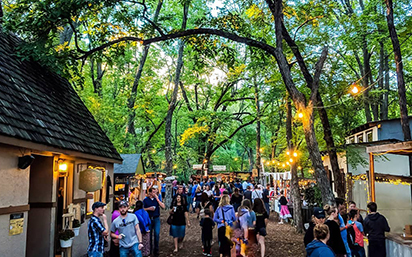 Actor and fellow K-State alum Patrick Murtha ’05 also has been involved in the Shakespeare
Festival. He and Moats had been good friends and neighbors for many years and had
acted together in various productions.
Actor and fellow K-State alum Patrick Murtha ’05 also has been involved in the Shakespeare
Festival. He and Moats had been good friends and neighbors for many years and had
acted together in various productions.
Murtha said they had many conversations over Moats’ picket fence, and one in particular
was about his vision of producing a Shakespeare festival.
Murtha has to confess that, at that time, he was skeptical about the whole idea, worried
it would only last a couple years. However, he gladly lent his support to his friend,
and the rest, as they say, is history.
“Here we are a decade later, the show is growing in leaps and bounds, every year drawing
more and more people in to see the famous plays of the Bard,” he said.
He encourages people to give the festival a try and just take in the whole experience:
the baked goods, beef pies and turkey legs, caramel apples, exhibitions with on-site
artists and a blacksmith, games, music and the general ambiance.
“Bringing to life Shakespeare’s characters and knowing that people appreciate this
moment is a world of its own — these are joys that can fill a heart,” he said.
Such stuff as dreams are made on
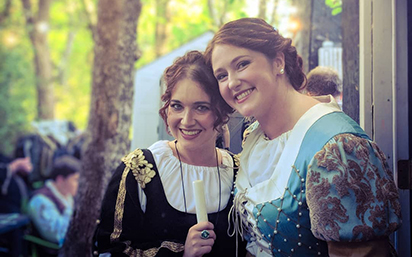 Both Moats and Murtha look back fondly on their time at K-State, and reflect on the
ways that it shaped them.
Both Moats and Murtha look back fondly on their time at K-State, and reflect on the
ways that it shaped them.
“As a slightly older, non-traditional student in the College of Business, I finished
out the bachelor’s degree that I still rely on in the family business in which I work
today,” Moats said.
While at K-State he also had the opportunity to take some introduction to acting classes
— classes he was interested in since he had been involved in theatrical productions
throughout high school and at the Columbian Theatre in Wamego, Kansas.
“My degree and acting experience has come in handy in bridging the gap between the
business side and the theater side of starting and running a nonprofit 501(c)(3) Shakespeare
festival,” he said.
Murtha said during his time at K-State, “Hale Library was my home.” He worked as a
research assistant to Phil Nel, a university distinguished professor in the Department
of English. He has memories of exploring the stacks and scouring through microfilm.
“It was a grand job,” he said. “It taught me how to dig for little treasures amidst
a sea of words.”
The play’s the thing
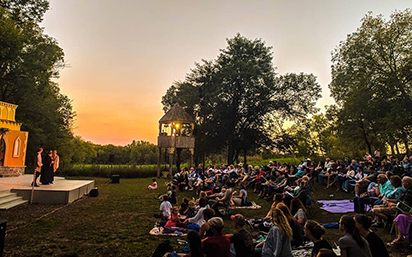 Even though Shakespeare’s plays were written approximately 400 years ago, their popularity
endures. Moats and Murtha have thoughts on why people continue to be drawn to the
Bard’s work.
Even though Shakespeare’s plays were written approximately 400 years ago, their popularity
endures. Moats and Murtha have thoughts on why people continue to be drawn to the
Bard’s work.
“Shakespeare is still relevant today because there is no better playwright in the
history of the English language,” Moats said. “His works still resonate with modern
audiences because he wrote, in a sense, almost outside of time. His works are timeless
because they are true and get to the heart of things in an extremely inspired way.
They show us much about ourselves if we are willing to look.”
Murtha adds that Shakespeare is one of those few artists that will live eternally.
“He has the two essential qualifiers of a great artist: a significant and universal
and common message, and a wonderful and poetical way of saying it, even when it is
mere prose. Even when he dabbles in outdated politics and squabbles, his characters
and his plots are as timeless as the common man because the plays are about the common
man, the everyday man, the man of yesterday and today and tomorrow. They are about
being human, about blundering, about mercy and justice, about envy and benevolence,
about mischief and good humor, about the vices and the virtues that make a human human.”
LEARN MORE about how you can attend the next Flint Hills Shakespeare Festival.

